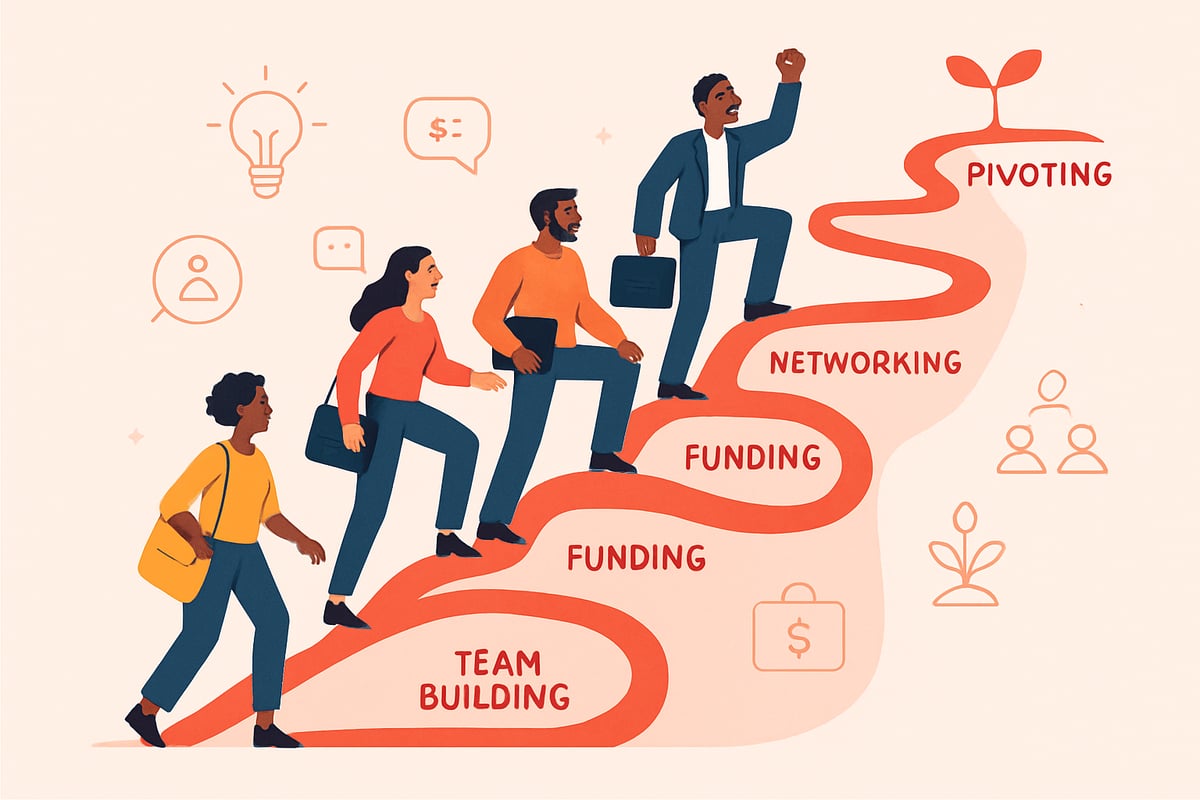Start Up Coaching Guide: Your Roadmap to Success in 2025
Imagine launching your business in 2025, fully equipped with a roadmap, expert guidance, and the confidence to tackle any challenge. That’s the promise of start up coaching.
In today's fast-paced landscape, founders need more than just a great idea—they need proven strategies, accountability, and a support system. This guide unpacks how start up coaching can help you accelerate growth, avoid costly missteps, and stay ahead of the competition.
Discover actionable steps, transformative benefits, and real-world examples. Ready to unlock your startup’s full potential? Dive in and let this roadmap guide your journey.
Understanding Start Up Coaching: What It Is and Why It Matters
Stepping into the world of startups can be thrilling and daunting at the same time. Founders often face uncharted territory, fast-changing markets, and high expectations. This is where start up coaching steps in, providing the structure, clarity, and support that founders need to turn ideas into thriving businesses.

Defining Start Up Coaching and Its Core Principles
Start up coaching is expert guidance designed for founders at any stage of their business journey. Unlike generic business advice or consulting, it’s tailored to the unique challenges and ambitions of startups. Start up coaching focuses on unlocking a founder’s potential through direct, actionable steps.
Core principles include:
- Goal-setting: Coaches help founders clarify business objectives and map out actionable milestones.
- Accountability: Regular check-ins and feedback ensure founders stay on track.
- Actionable feedback: Coaches offer honest, constructive input to drive growth.
- Network access: Coaches often connect founders to valuable contacts, partners, or investors.
For example, NYU’s Startup Coaching Program provides both one-on-one and group sessions, helping founders sharpen their vision and execution. Data shows startups with coaching or mentorship enjoy higher survival and growth rates. According to Business Coaching Industry Statistics 2025, these benefits are increasingly recognized in the startup world.
The Impact of Coaching on Startup Success
Start up coaching boosts founder skills, confidence, and decision-making. Coaches act as sounding boards, helping entrepreneurs spot strengths, weaknesses, and strategic opportunities. They guide founders through tough decisions and encourage them to push beyond their comfort zones.
Take NYU’s startup ecosystem as a case study. Startups that participated in coaching programs reported increased engagement and higher success rates than those without coaching support. Personalized coaching nurtures adaptability and resilience, two qualities essential for navigating rapid change and uncertainty.
Beyond survival, coaching contributes to long-term business viability and innovation. Founders are better equipped to pivot, capitalize on market trends, and lead their teams with clarity. This level of support helps startups avoid common pitfalls and seize growth opportunities.
Coaching vs. Mentoring: Key Differences for Founders
Although start up coaching and mentoring are often mentioned together, they serve distinct roles. Coaching is typically structured, goal-oriented, and focused on short-term results. Mentoring, on the other hand, is relationship-driven, long-term, and broader in perspective.
Here’s a quick comparison:
| Aspect | Start Up Coaching | Mentoring |
|---|---|---|
| Structure | Formal, scheduled sessions | Informal, as-needed meetings |
| Focus | Specific goals and action plans | General guidance, shared wisdom |
| Duration | Short to medium term | Ongoing, long term |
| Example | Paid business coach | Industry mentor |
Founders may benefit from both approaches. Coaches provide actionable plans for immediate challenges, while mentors offer experience and perspective for the bigger picture. Knowing when to seek each can be a game-changer for startup success.
Types of Start Up Coaching and Support Networks
Navigating the world of start up coaching means understanding the many types of support available to founders. Each approach offers unique benefits, from professional expertise to peer-driven learning. Here’s how you can tap into the most effective networks and coaching models for your startup journey.

Paid Business Coaches and Professional Services
Many founders choose to work with paid business coaches, gaining access to tailored expertise in areas like leadership, fundraising, and growth. These professionals provide individualized strategies, accountability, and clear metrics for progress.
One key advantage of start up coaching through paid services is the ability to address specific challenges with actionable plans. Coaches often bring years of entrepreneurial or industry experience, helping founders avoid common mistakes and seize opportunities.
For instance, a coach who has scaled several tech startups can offer insights that generic advisors may miss. This targeted guidance accelerates learning and increases the likelihood of long-term success.
Peer-to-Peer and Community-Based Coaching
Peer-to-peer start up coaching is grounded in mutual support. Founders come together to share experiences, offer feedback, and navigate obstacles as a collective. This approach fosters accountability, emotional support, and shared learning.
Communities like Slack groups, local meetups, and online forums are popular venues for these interactions. By engaging in peer coaching, founders build lasting relationships and often discover solutions faster through collective wisdom.
For a deeper dive into the value of these networks, explore Building a startup community, which highlights how strong communities amplify the benefits of start up coaching and founder support.
Accelerator and Incubator Programs
Accelerator and incubator programs offer structured start up coaching within a cohort setting. Accelerators are typically time-bound and intensive, focusing on rapid growth, while incubators provide ongoing support and resources.
Participants benefit from mentorship, funding opportunities, networking events, and workspace. For example, the NYU Startup Accelerator Program combines coaching with investor introductions and practical workshops, helping startups achieve key milestones.
Start up coaching in these environments is designed to be hands-on and goal-driven, driving measurable progress in a short period.
Angel Investors and Venture Capital Support
Angel investors and venture capital firms deliver more than just funding. Many also offer start up coaching through mentorship, strategic advice, and access to valuable networks.
Angels often have sector expertise, guiding founders through industry-specific challenges and making introductions to other investors or potential partners. Venture capitalists may assist with scaling operations, hiring, and navigating complex market dynamics.
This blend of capital and coaching gives startups a competitive edge as they move through different growth stages.
Industry-Specific and Niche Coaching
Some founders require start up coaching tailored to their unique sector, such as technology, healthcare, or finance. Industry-specific coaches bring deep knowledge of regulations, market trends, and customer needs.
For example, a climate tech startup might seek a coach with experience in sustainability and environmental policy. These experts help founders solve niche problems faster and accelerate market entry.
Choosing the right industry coach can make the difference between slow progress and rapid, sustainable growth.
The Start Up Coaching Roadmap: Step-by-Step Guide to Success in 2025
Launching a business in 2025 comes with unique challenges, but having a structured roadmap can make the journey clearer and more manageable. This step-by-step guide will show you how to leverage start up coaching for every phase of your founder journey. By following these steps, you will maximize your chances of success and build a strong foundation for your startup.

Step 1: Define Your Vision, Goals, and Challenges
Start up coaching begins with clarity. Before you can grow, you need a compelling vision and clearly defined goals. Ask yourself: What problem are you solving? Who are your customers? What impact do you want to make?
Assess your strengths and identify gaps. Use self-assessment tools or frameworks, like a SWOT analysis, to map out where you need support. Many founders discover that challenges with funding, team building, or product-market fit are top priorities.
For example, programs like NYU’s customer validation bootcamps help startups test assumptions and refine their business model. If fundraising is a major hurdle, coaches can guide you through actionable steps, such as those found in the Four steps for fundraising. Starting with a clear, honest assessment sets the stage for effective start up coaching.
Step 2: Identify and Select the Right Coaching Support
Not all start up coaching is the same. Once you know your needs, look for coaches who match your industry, stage, and goals. Evaluate their background — do they have direct startup experience or only generic business knowledge?
Explore multiple sources: LinkedIn, accelerator programs, founder events, and referrals. Compare candidates using a simple table:
| Criteria | Coach A | Coach B |
|---|---|---|
| Industry Experience | Yes | No |
| Startup Background | Yes | Yes |
| Proven Track Record | Yes | Limited |
Prioritize coaches who understand your sector and can provide actionable insights. The right start up coaching relationship will help you avoid costly mistakes and accelerate growth.
Step 3: Establish a Clear Coaching Relationship
Once you have selected your coach, set expectations early. Discuss communication preferences, session formats (virtual or in-person), and how often you will meet.
Define key performance indicators (KPIs) to measure progress. Establishing trust is essential — be open about your struggles, and expect honest, constructive feedback in return.
Regular check-ins keep you accountable and ensure both sides are aligned. A structured start up coaching relationship creates a safe space for learning, experimentation, and growth.
Step 4: Goal-Setting and Action Planning
With your coach, break down your vision into concrete, achievable steps. Use SMART goals (Specific, Measurable, Achievable, Relevant, Time-bound) to clarify your objectives.
Action planning frameworks, such as OKRs (Objectives and Key Results), help you focus on the most impactful tasks. Leading accelerators often use these methods to drive progress.
During start up coaching sessions, revisit your goals, assess what is working, and adjust your plans as needed. This structured approach ensures steady momentum and measurable outcomes.
Step 5: Execution, Accountability, and Continuous Feedback
Now it is time to execute your plan. Start up coaching provides ongoing support and keeps you accountable for each milestone.
Use tools like progress trackers, shared dashboards, or regular email updates to monitor your growth. Coaches offer critical feedback to help you iterate and pivot where necessary.
Celebrating small wins is important for morale. Consistent accountability ensures you stay focused, adapt quickly, and build resilience as a founder.
Step 6: Expanding Networks and Accessing Resources
One of the biggest benefits of start up coaching is access to new networks and resources. Coaches can introduce you to investors, partners, or talent that would otherwise be hard to reach.
Leverage your coach’s connections to attend exclusive events, join founder communities, or access startup catalogs. Programs like NYU’s accelerator extend these benefits to their participants.
Broader networks open doors to funding, knowledge, and collaboration. This step of start up coaching is vital for scaling your business and staying competitive.
Step 7: Review, Reflect, and Pivot as Needed
Growth is not always linear. Schedule regular reviews with your coach to reflect on what is working and what needs to change.
Use setbacks as learning opportunities. Coaches help you analyze results, adjust strategies, and pivot when necessary.
Long-term, start up coaching builds your adaptability and strengthens your ability to navigate uncertainty. By embracing feedback and continuous learning, you will be better prepared for future challenges.
Characteristics of Effective Start Up Coaches: What to Look For
Choosing the right expert for start up coaching can shape your founder journey and business trajectory. The best coaches share a set of traits that empower founders, unlock potential, and drive real results. Here are the key characteristics to prioritize when searching for your ideal coach.

Industry and Entrepreneurial Experience
An effective start up coaching relationship begins with a coach who has walked the founder’s path. Coaches with real startup and sector experience bring nuanced insights, having faced similar challenges themselves. They can translate their journey into actionable steps relevant to your unique business landscape.
Such experience means your coach can anticipate pitfalls, offer practical advice, and introduce proven frameworks. For instance, a coach who has successfully scaled startups understands the realities of rapid growth, pivots, and resource constraints.
Track Record with Similar Clients
Evidence of success is essential. Look for coaches who have a strong track record guiding founders at your stage or in your industry. Case studies and testimonials from similar businesses demonstrate credibility and effectiveness.
A results-driven approach in start up coaching ensures you gain access to strategies that have worked for others. This transparency also helps set expectations and builds trust from the start.
Personal Connection and Communication Style
A strong personal connection underpins productive start up coaching. Open communication, trust, and mutual respect allow you to be vulnerable, seek honest feedback, and accelerate learning.
Watch for warning signs such as a generic approach or lack of engagement. The best coaches adapt their style to your needs, making you feel heard and supported in every interaction.
Availability and Commitment
Time is a founder’s most precious resource. Your coach should balance professional boundaries with genuine availability and responsiveness. Effective start up coaching means having a partner who is invested in your growth and ready to support you through challenges.
Consistent check-ins and prompt responses signal true commitment. Avoid coaches who are difficult to reach or appear disinterested in your success.
Motivation and Values Alignment
A coach’s motivation shapes your experience. Coaches driven by your success, rather than just financial gain, foster a productive and ethical start up coaching partnership. Values alignment ensures that your goals and vision remain at the forefront.
For more on the impact of mindset and strategy on startup success, see How successful startups conquer competition.
Personalized Approach
Every founder’s journey is different. Effective start up coaching involves tailoring advice to your strengths, challenges, and context. Avoid one-size-fits-all solutions; seek coaches who invest time to understand your business and adapt their guidance accordingly.
A personalized approach leads to more relevant insights, better decision-making, and long-term growth.
Quick Comparison Table:
| Characteristic | Why It Matters | What to Look For |
|---|---|---|
| Industry Experience | Relevant, actionable insights | Startup/sector background |
| Track Record | Proven effectiveness | Testimonials, case studies |
| Personal Connection | Trust, open communication | Rapport, engagement |
| Availability | Consistent support | Responsiveness, commitment |
| Values Alignment | Shared vision, ethical guidance | Motivation, mindset fit |
| Personalized Approach | Tailored strategies for your needs | Custom advice, flexibility |
Choosing a coach with these traits ensures your start up coaching journey is impactful, supportive, and aligned with your long-term goals.
Common Challenges Startups Face and How Coaching Helps Overcome Them
Startups inevitably encounter roadblocks, but start up coaching equips founders with the tools, strategies, and mindset to face these challenges head on. Whether you are struggling with funding, team dynamics, or scaling, the right coaching can make all the difference in your journey.
Securing Funding and Financial Planning
Raising capital is one of the top hurdles for early-stage founders. Navigating angel investors, venture capital, and grants is complex and competitive.
Start up coaching helps refine your pitch, clarify your business model, and prepare financial plans. Coaches also introduce you to potential investors and provide insights into what drives funding decisions.
Market Entry and Customer Acquisition
Identifying and validating your target market can be daunting. Even brilliant products can struggle without the right go-to-market strategy.
Coaches bring proven frameworks for market research, customer interviews, and feedback loops. Through start up coaching, founders learn how to test assumptions, iterate quickly, and build traction with their ideal customers.
Building and Managing Teams
Recruiting and retaining talent is a make-or-break factor. Many founders lack experience in leadership, hiring, or managing co-founder relationships.
Coaches guide you through defining roles, building culture, and resolving conflicts. For deeper insights into co-founder dynamics, explore Co-founder and founder dynamics to see how coaching can address these sensitive relationships.
Scaling Operations and Managing Growth
As your business grows, so do the operational complexities. Founders often struggle with scaling systems, processes, and teams efficiently.
Start up coaching provides operational best practices, helps set up scalable structures, and identifies early warning signs of growth pitfalls. Coaches keep you accountable and ensure sustainable expansion.
Navigating Competition and Industry Changes
Markets evolve rapidly, and competitors are always innovating. Staying agile is essential for long-term success.
With start up coaching, founders learn to anticipate trends, pivot strategies, and identify niche opportunities. Coaches keep you focused on your unique value proposition while staying adaptable.
Emotional Resilience and Founder Wellbeing
The entrepreneurial journey is emotionally taxing, from stress and setbacks to burnout. Many founders underestimate this challenge.
Coaches offer a safe space to process emotions, build resilience, and develop healthy coping mechanisms. This support is critical for maintaining focus and motivation through the ups and downs of startup life.
| Challenge | Coaching Solution |
|---|---|
| Funding | Pitch refinement, investor introductions |
| Market Entry | Customer validation, go-to-market strategies |
| Team Building | Leadership coaching, conflict resolution |
| Scaling | Operational systems, growth planning |
| Competition | Trend analysis, strategic pivots |
| Wellbeing | Resilience training, emotional support |
With start up coaching, founders are empowered to turn obstacles into opportunities, gaining both confidence and clarity as they grow their business.
How to Find and Engage the Best Start Up Coaches in 2025
Finding the right start up coaching support can feel overwhelming, but with a clear process, you can connect with coaches who truly fit your needs. Here is how to approach your search and build a relationship that drives your startup forward.
Researching and Vetting Potential Coaches
Start by researching coaches through professional networks, recommendations, and trusted online platforms like LinkedIn or founder communities. Examine each coach’s credentials, experience, and testimonials to gauge their effectiveness. Reviewing current Coaching Industry Statistics 2025 can help you understand trends and what top-performing coaches offer. Look for those with proven results in start up coaching, especially in your industry or business stage.
Prepare a checklist:
- Verify industry and startup experience
- Request client references
- Assess communication style in initial messages
This groundwork saves time and helps you avoid mismatches.
Leveraging Startup Ecosystems and Events
Startup ecosystems are goldmines for discovering high-quality start up coaching. Participate in accelerators, incubators, or startup festivals. These venues often pre-vet coaches and provide structured introductions. For example, university entrepreneurship events or programs connect founders with specialized coaches familiar with your sector’s challenges.
Make the most of:
- Networking sessions
- Panel discussions
- Workshops and Q&A events
Attending these increases your chances of meeting coaches aligned with your vision.
The Value of Community and Peer Recommendations
Leverage the wisdom of the founder community when seeking start up coaching. Peer recommendations from Slack groups, local meetups, or online forums offer authentic insights into coaches’ effectiveness. Founders who have worked with coaches can share candid feedback on what worked and what did not.
Tap into:
- Online discussion boards
- Alumni networks
- Peer-to-peer coaching circles
Crowdsourcing opinions helps you avoid common pitfalls and find trusted support.
Setting Up Initial Consultations and Trials
Once you have a shortlist, arrange introductory calls or trial sessions. Use these meetings to assess the coach’s approach, availability, and compatibility with your goals. Prepare questions about their start up coaching methods, track record, and how they measure success.
Key questions to ask:
- What is your coaching process?
- Can you share a relevant success story?
- How do you handle feedback and accountability?
A trial session reveals if the coach’s style fits your learning preferences.
Maximizing the Coaching Relationship for Long-Term Growth
To get the most from your start up coaching, set clear goals, feedback loops, and review periods. Regularly reassess your needs and outcomes to ensure the relationship remains valuable as your business evolves. Open communication and mutual respect will help both you and your coach adapt strategies for changing circumstances.
Remember, the right coach becomes a long-term partner in your entrepreneurial journey, helping you navigate challenges and celebrate wins.
Now that you know how powerful coaching can be for your startup journey in 2025, why not take the next step and connect with others who truly get it? Being part of a community of ambitious founders gives you access to shared insights, networking opportunities, and real support as you put your roadmap into action. You don’t have to build your business alone—the right people and resources can make all the difference. If you’re ready to level up and surround yourself with fellow Swiss entrepreneurs, apply to our swiss founders community.

